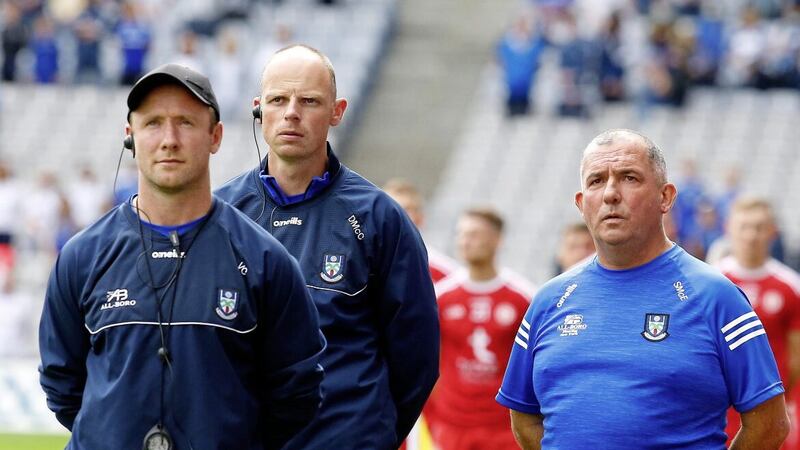BEING an eyewitness to the toll societal change is taking on young people across the country, Michael Gerard Ó Dochartaigh could see that some outside of the box thinking was required to try and stem the tide.
As a primary school teacher at west Belfast’s Bunscoil an tSléibhe Dhuibh, a juvenile coach at Pádraig Sáirséil and a father of two young boys, with another child on the way, most of Ó Dochartaigh’s days are spent with children.
Talking to them, offering guidance and, most importantly, trying to understand and help overcome the challenges they face.
Somewhere along the line, it dawned on him that something had been lost. The connections between the GAA and its communities, the ones that formed such an integral part in his own upbringing, remain strong.
But more can be done to adapt to today’s world. He sees it day in, day out.
That’s why earlier this year Ó Dochartaigh created a series of personalised booklets called ‘Live, Learn, Love Gaelic Games’ – one for football, one for hurling and camogie – aimed at primary school children that go way beyond the traditional coaching tips and techniques, focusing equally on feelings, frustrations and, most importantly, fun.
They are part skill sheet, part photo album, part scrapbook, they offer a chance to learn and a chance to bond.
“I’ve seen so much within the school and club setting where family life has just slipped, completely changed, especially in the past decade,” said Ó Dochartaigh.
“Children just seem to be that wee bit lost. This isn’t representative of every family of course, but I certainly find more and more kids are trying to find an area in life where they fit in, where they have a purpose and where they feel valued.
“People’s lives have got a lot busier, the pressures of life have increased and the way the world has changed in terms of the virtual reality out there, social media and gaming consoles have completely taken over.
“When I was growing up, playing on a games console was a luxury, something you were maybe allowed to do once in a blue moon with friends or at the weekend. Now it has almost become the go-to for kids when they get in from school.
“From a sporting perspective, it’s very hard to compete with something that’s so over-stimulating, and I just feel they are missing out on so much in terms of their social skills, their physical development. That’s clear to see in a school setting and in a club setting.
“Emotionally too, I believe it’s created a lot of issues that people haven’t quite realised or seen. Creativity is on the wane, levels of resilience and dealing with real social scenarios out in the world, as opposed to just losing on a computer game where you turn it back on and go again. Life just isn’t like that.
“When you look at the staggering numbers of young people taking their own lives and struggling with their emotional wellbeing, it’s no coincidence that it goes hand in hand with a lot of the changes we’ve seen in the past decade.”
Encouraging a sense of community is critical, therefore, but so too is participation and restoring a sense of self-worth.
“Some of the issues that exist here is deeper rooted, of course, especially in the likes of our own area with the Troubles, where it would have been uncommon to speak about your feelings.
“That has all fed into an environment where children have lost their voice a bit, and don’t have as many mechanisms to offload and discuss how they’re feeling.
“The primary place that should be taking place is in the home and the likes of these booklets can maybe create a platform for children to have conversations with their parents about something that’s inspiring, thought-provoking, something that’s healthy and so positively engaging.
“That’s why it was important for me, even right from the nursery age group, that children are being asked - what was your favourite thing at training? What friends did you make? Did you enjoy it?
“There’s also an element where kids are asked to create their own wee games out in the back yard or in the park with their parents. When they then go to their sessions at the club, the confidence is high, they’re problem solving, they’re showing a game they’ve helped create.
“Straight away you’re giving them a voice.”
Since their unveiling, Ó Dochartaigh’s booklets have been used in over a dozen countries, including several in Asia. The message is universal, and he wants to keep spreading the word.
“This began with my own club and, honestly, I didn’t think there would be any interest beyond that. The likes of Owen Mooney [Dublin’s learning and games development co-ordinator] and Philip Kerr [Derry games development committee member] were a huge source of encouragement from the very start.
“You just hope you’re tapping into something that can ultimately help kids in the long run. The sense of belonging you’re trying to create, by the time they are 16 or 17, that’s when it is so much more important. That’s when you see players believing in themselves when they could have been somewhere else, doing something else.
“When you don’t see a purpose in life, that’s when things get scary. Even looking at our own club, 10 of our boys played senior football there the other night, all from the one group – for any coach to see that, that’s your All-Ireland medal right there.
“Hopefully there’s something in these booklets for everyone, and for me that’s the end game; keeping as many people involved in the GAA for as long as possible. How do you do that?
“By making them feel valued.”
For more information visit www.livelearnlovegaelicgames.com, or for any clubs or schools seeking further information, contact Michael Gerard Ó Dochartaigh via Twitter (@livelearnlovegg), Instagram (@livelearnlovegg) or email livelearnlovegaelicgames@outlook.com



